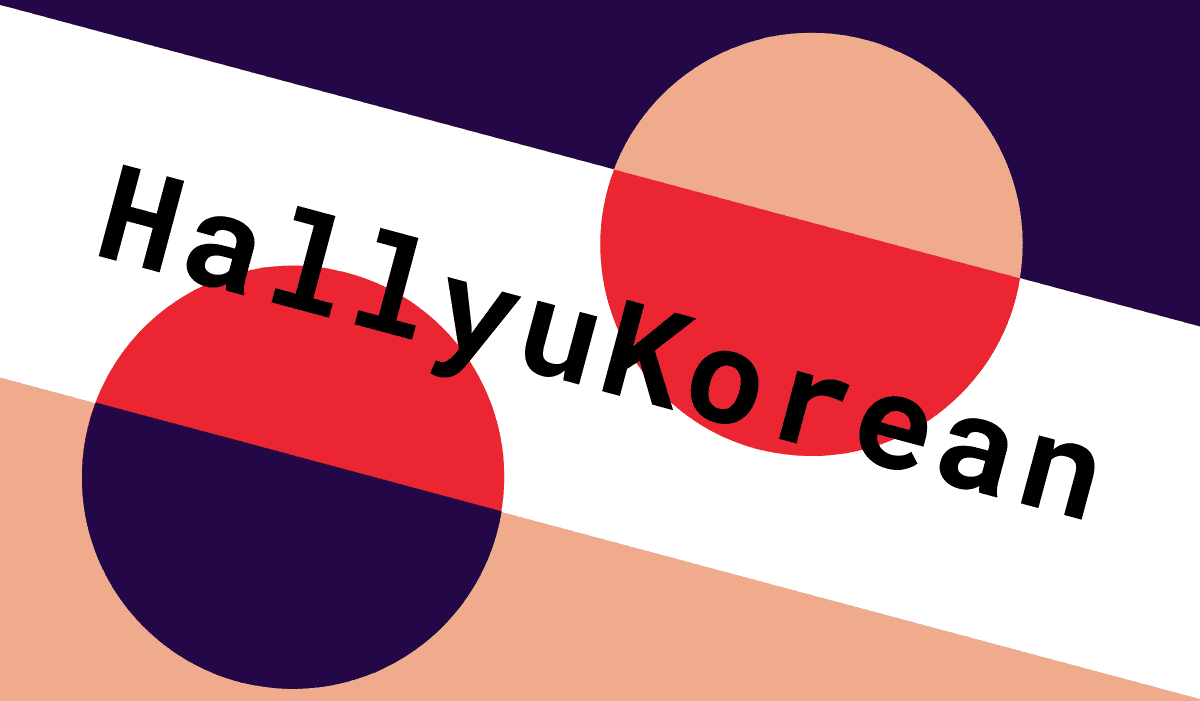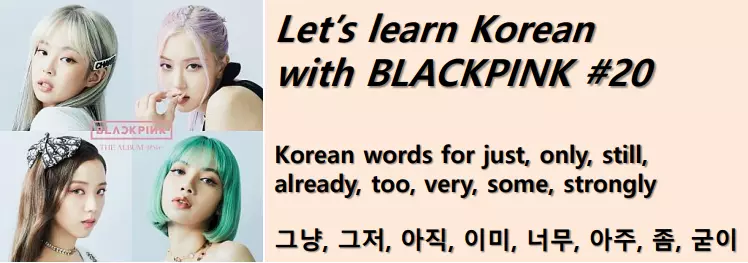Most common Korean adverbs : 그냥, 그저, 아직, 이미, 너무, 아주, 좀, 굳이
Let’s learn most common Korean adverbs with BLACKPINK lyrics.
Click the play button below to listen to all the BLACKPINK lyrics used in this post.
그냥 [geu-nyang] just, simply, as it is
그냥 우린 아니었던 거지 뭐
geu-nyang u-rin a-ni-eot-deon geo-ji mwo
I guess we just weren’t meant to be
*그냥(just) +
우린(우리(we) + 는(topic particle), =우린) +
아니었던(아니다(be not) + 었던(noun modifier for past tense)) +
거지(것(thing) + 이다(be)) +
뭐(well)
(*Verb stem + ~던 is used to recall a past action or habit that has been repeated often or is still present.
Verb stem + ~았/었던 is used to recall a past event that has not continued into the present.
뭐 is usually the shortened form of 무엇. 무엇 is a noun and 뭐 is an adverb or a noun.
뭐 can also mean ‘you know’, in which case it means that the situation can’t be changed.)
그저 [geu-jeo] just, only
그저 내 곁에 stay with me
geu-jeo nae gyeo-te stay with me
Just stay with me by my side
*그저(just) +
내(나(I) + 의(of), =내) +
곁(side) + 에(at)
stay with me
아직 [a-jik] still, yet
온 세상이 바뀌어가도 아직 나는 그대론 걸
on se-sang-i ba-kkwi-eo-ga-do a-jik na-neun geu-dae-ron geol
I’m still the same, even if the whole world changes
온(whole) +
세상(world) + 이(subject particle) +
바뀌어가도(바뀌어가다(change) + ~도(even if)) +
아직(still) +
나(I) + 는(topic particle) +
그대론(그대로(as it is) + ㄴ(noun modifier)) +
걸(것(thing) + 을(object particle), 걸)
이미 [i-mi] already
이미 지웠어 네 전화번호
i-mi ji-wot-sseo ne jeo-nwa-beo-no
I already erased your phone number
*이미(already) +
지웠어(erased, past tense of 지우다) +
네(너(you) + 의(of), =네) +
전화(phone) + 번호(number)
(*This sentence has no subject.
It’s important to note that while English sentences require a subject, Korean sentences often omit the subject.
The omitted subject can be identified in the context of the dialogue or writing.
Word order is important for understanding English sentences, while particles (e.g. 은/는/이/가/을/를) are important for understanding Korean sentences.
It is important to note that in Korean the verb is at the end of the sentence, which is different from the order in English.
The following is more common, but because it’s lyrics, the object may be backwards.
난(subject) 네 전화번호를(object) 지웠어(verb))
너무 [neo-mu] too, very
너무 밉지만 사랑해
neo-mu mip-ji-man sa-rang-hae
I hate you so much, but I love you
*너무(too) +
밉지만(밉다(hate) + ~지만(but)) +
사랑(love) + 해(do)
(*This sentence also has no subject.
The omitted subject can be identified in the context of the dialogue or writing.)
아주 [a-ju] very
아주 매력적이에요
a-ju mae-ryeok-jeo-gi-e-yo
It’s very attractive
*아주(very) +
매력적이에요(매력(charm) + ~적(suffix) + 이다(be))
(*~적 is a suffix that turns a noun into an adjective or an adverb.
Noun + 적 + 이다’ is an adjective and ‘Noun + 적 + 으로’ is an adverb.)
좀 [jom] some, a little
사실 난 좀 두렵기도 해
sa-sil nan jom du-ryeop-gi-do hae
Actually, I’m a little scared
*사실(in fact) +
난(나(I) + 는(topic particle), =난) +
좀(a little) +
두렵기(두렵다(be afraid) + ~기) + 도(too) +
해(be)
(*Adding ~기 to a verb stem makes the verb a noun.)
굳이 [gu-ji] obstinately, strongly
굳이 너여야만 하는 이유는 묻지마
gu-ji neo-yeo-ya-man ha-neun i-yu-neun mut-ji-ma
Don’t ask me why it has to be you
*굳이(strongly) +
너(you) + 여야만(connective ending) +
하는(하다(do) + 는(noun modifier) +
이유(cause) + 는(topic particle) +
묻지마(묻다(ask) + ~지마(don’t))
(*Noun + 이어야/여야 is a connective ending used when the preceding statement is an essential condition for the following statement.)
Grammar Reference
*Verb stem + ~던 is used to recall a past action or habit that has been repeated often or is still present.
Verb stem + ~았/었던 is used to recall a past event that has not continued into the present.
ex)아니었던 거지 : 아니다(to be not) + 었던(noun modifier for past tense) + 것(thing) + 이다(to be)
Korean sentence structures
This table provides a simplified comparison of declarative sentence structure between Korean and English.
It is important to note that actual sentence structures may vary depending on the complexity and context of the sentence.
However, this table provides a general overview of the differences in sentence structure between the two languages.
| English | Example | Korean | Example | |
| Type 1 | S+V | I run | S+V | 나는 달려 |
| Type 2 | S+V+C | I am a student | S+C+V | 나는 학생이야 |
| Type 3 | S+V+O | I love you | S+O+V | 나는 너를 사랑해 |
| Type 4 | S+V+IO+DO | I gave him an apple | S+IO+DO+V | 나는 그에게 사과를 주었어 |
| Type 5 | S+V+O+C | You make me happy | S+O+C+V | 너는 나를 행복하게 해 |
BLACKPINK music video to enjoy
Well done for making it this far.
Watch the STAY music video above and see if you can hear “너무 밉지만 사랑해”, which you learned today.


